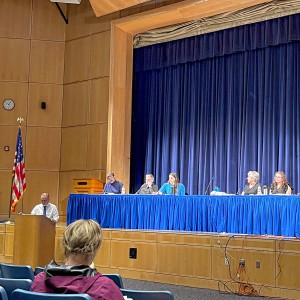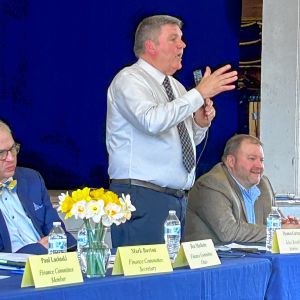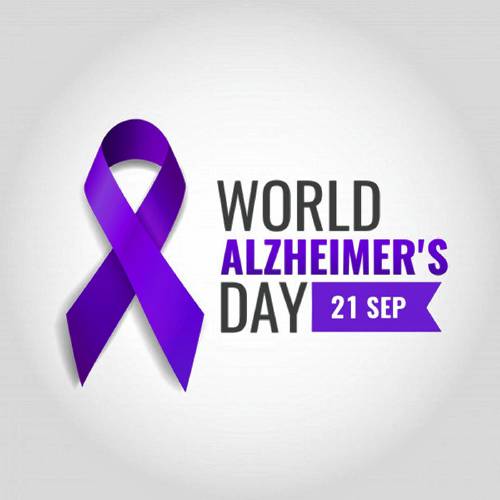My Turn: Alzheimer’s, my dad, and me
| Published: 09-20-2023 6:09 PM |
I looked for it under a tree. But in the end, I found it near the bushes lining the edge of his condominium yard. I wish I could say that it was hidden. It was not. It stood out, a solid brown mass of poop in plain sight.
Unlike my dad’s very visible accident, the disease that caused it is stealthy. Alzheimer’s is like Cary Grant in “To Catch a Thief,” who grabs diamonds from an upstairs bedroom and noiselessly carries them across a city’s rooftops.
The first signs — lost keys, lost wallet, confusions about dates — are imperceptible. Can’t remember a name? Forgot that you already bought peanut butter last time you went shopping? Confused about the day of the week? Sure, these could be early signs of dementia. Or they could just be life.
Grown children often fail to recognize signs of dementia in their aging parents, who loom in our memories as all-powerful Olympians. When I was little, my dad amazed me with what he could do. He could cook a French dinner! He could ride a bicycle with enviable ease! He knew all the lyrics to the musical “Oklahoma!” How could this same person, a man who could parse a Law Review article in one minute and reel off Joe Montana’s touchdown completion stats the next, poop under a tree and not fully remember it?
You might think that this moment would produce an epiphany. Like I would look at this drying lump and think to myself, “Oh yeah, my dad has Alzheimer’s!” This did not happen. But epiphanies about Alzheimer’s don’t often happen. Like the disease itself, understanding and then acceptance of Alzheimer’s come slowly, less like a light bulb and more like a slow tide on Nauset Beach making its way in.
What does it mean to understand Alzheimer’s? My limited grasp started only when my dad lost so much of his memory that even I could not fail to notice. Shortly after the incident, my dad mentioned how much he was enjoying his visit to Massachusetts. I laughed. “Quite a long “visit, eh?” He seemed confused, so I reminded him that he moved to Northampton back in 2018.
He looked stunned. Then he started to cry. This was the closest I came to any sudden realization. As I watched my dad, I finally realized that in his mind, he was out to see me and my family for a quick visit. A few weeks later, he once again talked about his visit “out East.” Then called me “Joan,” his sister’s name. And then a few more weeks later, he asked, “Joan, are our parents still alive?”
Article continues after...
Yesterday's Most Read Articles
 Bridge of Flowers in Shelburne Falls to open on plant sale day, May 11
Bridge of Flowers in Shelburne Falls to open on plant sale day, May 11
 Serious barn fire averted due to quick response in Shelburne
Serious barn fire averted due to quick response in Shelburne
 $12.14M school budget draws discussion at Montague Town Meeting
$12.14M school budget draws discussion at Montague Town Meeting
 As I See It: Between Israel and Palestine: Which side should we be on, and why?
As I See It: Between Israel and Palestine: Which side should we be on, and why?
 Greenfield homicide victim to be memorialized in Pittsfield
Greenfield homicide victim to be memorialized in Pittsfield
 ‘We are among the leaders’: Ashfield Town Meeting voters pass bevy of clean energy proposals
‘We are among the leaders’: Ashfield Town Meeting voters pass bevy of clean energy proposals
All of this sent me scurrying to various websites — Alzheimer’s Association, Alzheimer’s Foundation of America, Fisher Center for Alzheimer’s Research Foundation. The more I read, I learned that Alzheimer’s is a disease, not an intrinsic part of aging. Most older people — my 83-year-old uncle, my friend’s 89-year-old father, roughly half of the U.S. Senate — might have some memory loss, but not Alzheimer’s.
I also began to understand its symptoms and trajectory. Researchers stage Alzheimer’s in different ways: early/middle/late, or mild/moderate/severe, or Stage 1 to Stage 7. All list specific behaviors to help caregivers wrap their heads around what they’re seeing. Confusion about paying bills? That shows up in the middle. Difficulty with dressing? That appears much later. Loss of language comes at the very end. Learning these stages let me map where my dad had been and where he is headed.
Most importantly, seeing where he was going motivated me to act. In late 2021, when my dad landed in the hospital for a medical issue unrelated to his dementia, I used his multi-week recovery to sell his condo and relocate him to an assisted living facility. When the rehab facility finally discharged him, I brought him to his new “home.”
He was not happy. He raged, swore, and cried, and so did I. But I remained firm because I now knew what the disease had done to his brain and what was coming next. Indeed, my dad spent only 18 months in assisted living before I had to move him to a memory unit with a higher level of care. That’s where he is now.
With all this understanding has come empathy. I no longer snipe at my dad for his tantrums or his forgetfulness. My childhood grievances became muted then replaced by compassion for his suffering.
After all, he never asked to be in this position. Sure, people can reduce their chances of Alzheimer’s by modifying their diets, stopping their smoking, curbing their drinking, and getting physical activity. And yes, we should all do these things! (Please, reader, for the love of Pete — do these things!) Yet even people who do everything right can still succumb to it.
My dad did not do everything right. But he also didn’t cause his own disease. I don’t blame him for getting sick, nor will I blame myself if the disease begins to take root in my own body. If I do get Alzheimer’s, some of my care will fall to my own kids, who (glass half full here!) now have a front row seat for their grandfather’s decline. They found their own way to compassion more quickly than I did, and watching their tenderness toward my dad continues to inspire me.
And does my dad. He often laughs at his own forgetfulness, and this lets me know that part of him is still self-aware. He continues to ask about his granddaughters and loves any updates about them, even as he moves into the late stages of the disease. He takes pleasure in our regular coffee dates. He hugs me easily these days and thanks me for helping him. In return I can more easily hug him and thank him for all he’s done for me, too.
The thinking part of my dad’s brain remembers none of these moments. But his joy at each of them is gratifying and a reminder that life, love, and happiness do not have to stop with this disease.
Jenny Adams is a professor of English at the University of Massachusetts Amherst. She lives in Northampton. Today is World Alzheimer’s Day.



 Guest columnist Gene Stamell: We know what we know
Guest columnist Gene Stamell: We know what we know Michelle Caruso: Questions candidate’s judgment after 1980s police training incident
Michelle Caruso: Questions candidate’s judgment after 1980s police training incident Kathy Sylvester: Vote for expertise on May 6
Kathy Sylvester: Vote for expertise on May 6 Shirley and Mike Majewski: Vote for Blake Gilmore
Shirley and Mike Majewski: Vote for Blake Gilmore
